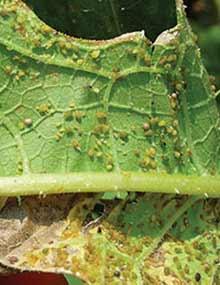

High Tunnel Melon and Watermelon Production, Page 03
Revised
Melon aphids congregate on lower leaf surfaces and cause cupping of the leaves
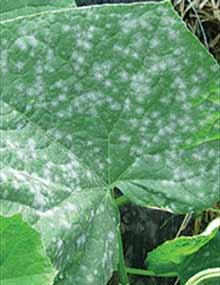
High Tunnel Melon and Watermelon Production, Page 06
Revised
The dry, humid and dense plant growth within a high tunnel is optimal for development of powdery mildew.
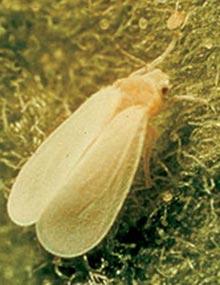
High Tunnel Melon and Watermelon Production, Page 09
Revised
Whiteflies are small, soft-bodied insects with wings covered with white, powdery wax that damage plants by sucking the sap and transmitting harmful viruses.
Collective Bargaining 1: Historical Models of Collective Bargaining in the U.S. - Page 2
Revised
Economic framework for collective bargaining The economic framework for collective bargaining
The model of collective bargaining that has dominated American industrial relations since the 1930s relies on the relati
Collective Bargaining 1: Historical Models of Collective Bargaining in the U.S. - Page 5
Revised
Organization of the relevant workforce Organization of the relevant workforce
To solidify bargaining power, an important union goal is to organize those workers that represent a threat to union member wage levels and job secur

Collective Bargaining 3: Effective Negotiations, Background Information
Revised
Discover tips and guidance on building sound footings and foundations to ensure strong, long-lasting structures.
Collective Bargaining 4: The Bargaining Climate - Page 3
Revised
The bargaining climate
In developing the bargaining goals and strategies of a local union, it is important to remember that not all relationships with employers are equal. The attitude of a particular employer toward the union and the obligation to bargain may range from the very positive to one approaching industrial warfare.
Collective Bargaining 5: Bargaining Techniques - Page 3
Revised
Learn effective documentation and argumentation strategies to strengthen your union's position during collective bargaining negotiations.

Contract Interpretation Standards
Reviewed
This publication outlines standards for interpreting collective bargaining agreements, focusing on arbitration principles and contract language clarity.
Collective Bargaining 1: Historical Models of Collective Bargaining in the U.S. - Page 3
Revised
Employers ability to pay
Product market factors
Collective Bargaining 1: Historical Models of Collective Bargaining in the U.S. - Page 6
Revised
Avoidance of competitive unionism Avoidance of competitive unionism
Union bargaining strength is also weakened by wage competition between more than one union in each industry or with a particular employer.
Collective Bargaining 3: Effective Negotiations, Background Information - Page 2
Revised
Research agenda Research agenda
Early in the bargaining process, a local union may want to develop a research agenda to gather data useful in negotiations.

Collective Bargaining 5: Bargaining Techniques
Revised
In this section, some of the major techniques and tactics relevant to the actual bargaining sessions with management are discussed. Visit our site today.
Collective Bargaining 5: Bargaining Techniques - Page 4
Revised
Caucus
An important tactic in the collective bargaining process is the effective use of a caucus. A caucus is the opportunity for the parties to withdraw temporarily from direct negotiations one another. A caucus can and should be used in several different situations to make sure that negotiations are progressing in an appropriate manner.
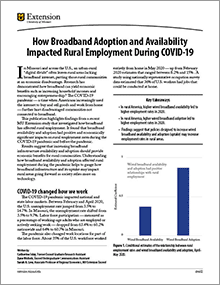
How Broadband Adoption and Availability Impacted Rural Employment During COVID-19
New
Learn how broadband affected rural employment rates before and during the COVID-19 pandemic.

Collective Bargaining 1: Historical Models of Collective Bargaining in the U.S.
Revised
Explore historical models of collective bargaining in the U.S., from early political and economic unions to modern labor organization strategies.
Collective Bargaining 1: Historical Models of Collective Bargaining in the U.S. - Page 4
Revised
Labor market factors Labor market factors
The employer's ability to pay is also influenced by its ability to cut the costs of production by increasing productivity.
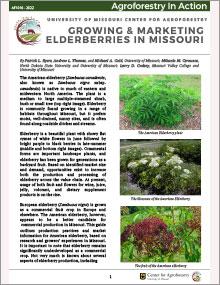
Collective Bargaining 1: Historical Models of Collective Bargaining in the U.S. - Page 7
Revised
Development of appropriate bargaining structures Development of appropriate bargaining structures
In addition to worker organization, a union must also develop a bargaining structure that allows the union t
Collective Bargaining 3: Effective Negotiations, Background Information - Page 3
Revised
Preparation of demands (changes to the CBA) Preparation of demands (changes to the CBA)
There are two aspects of the process of preparing bargaining demands or proposals.
Collective Bargaining 4: The Bargaining Climate - Page 2
Revised
The goals of the employer
While the list of potential union goals in bargaining is unlimited historically, it has been suggested that management has a much shorter bargaining agenda.
Collective Bargaining 5: Bargaining Techniques - Page 2
Revised
Explore key procedural strategies in collective bargaining, including setting ground rules and managing negotiations effectively.

Just Cause Basics
Revised
Explore the seven tests of just cause in employment discipline, their origins, and application in unionized and non-unionized workplace settings.
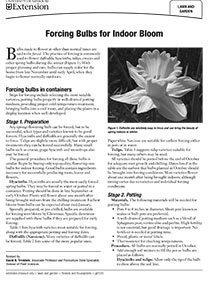
Forcing Bulbs for Indoor Bloom
Reviewed
Forcing bulbs indoors brings spring color to your home during winter. Learn how to select, chill, and pot bulbs like daffodils, tulips, and hyacinths.